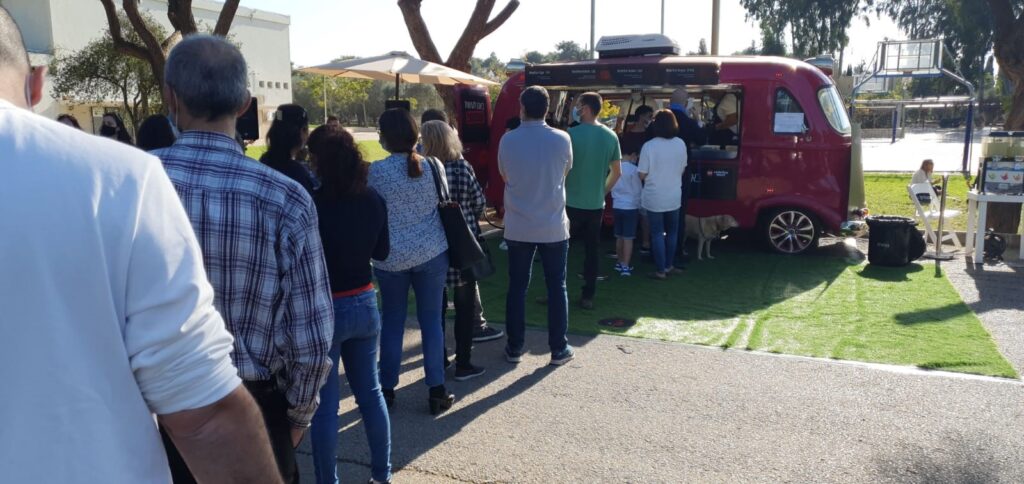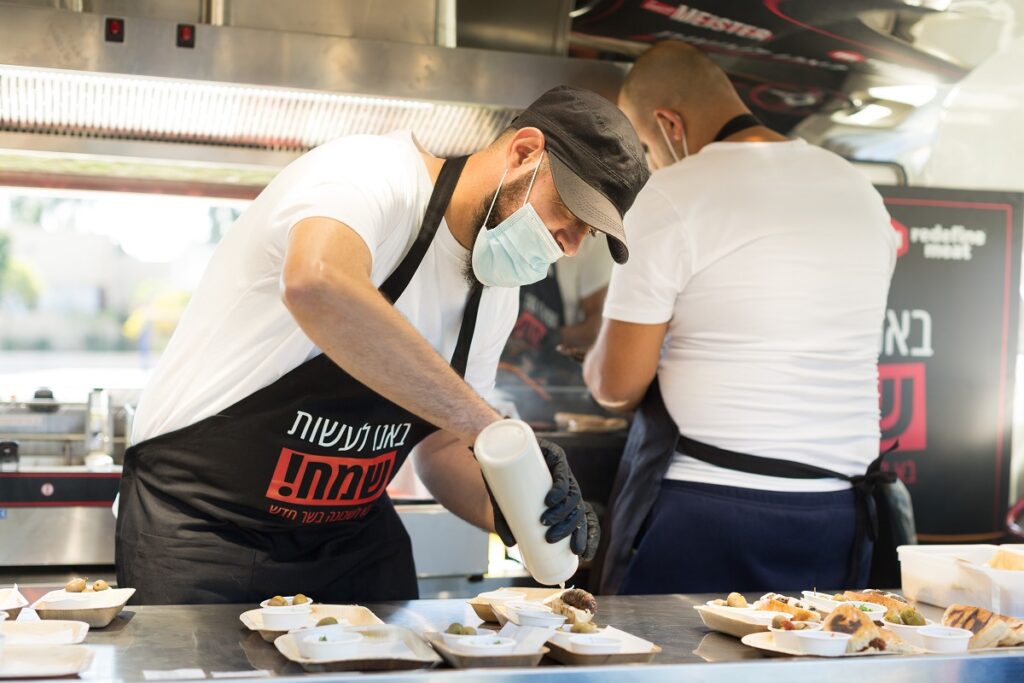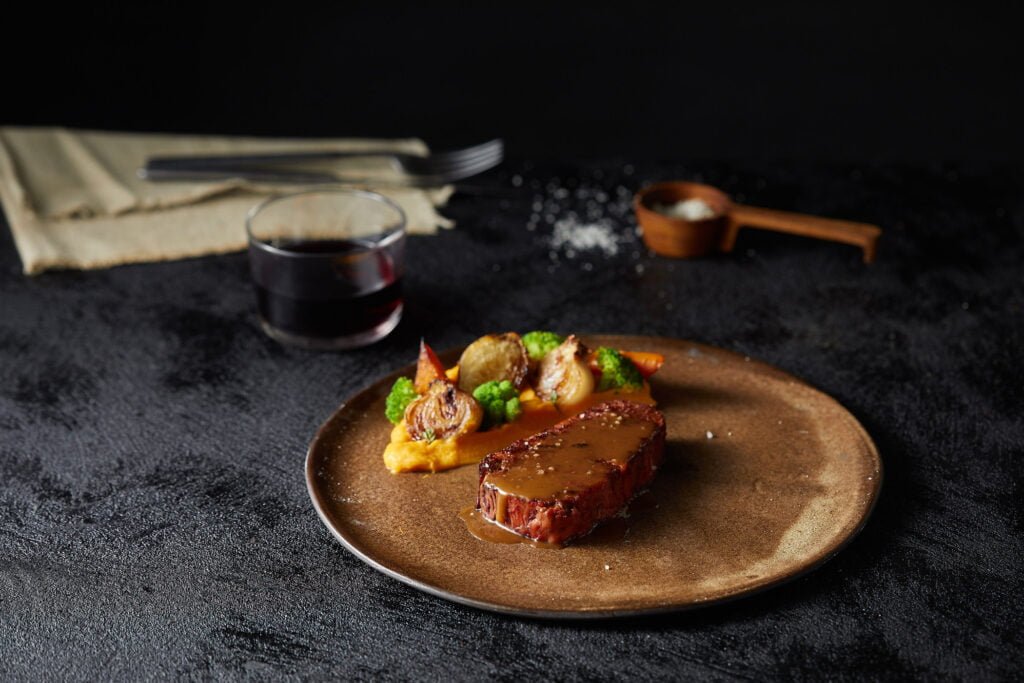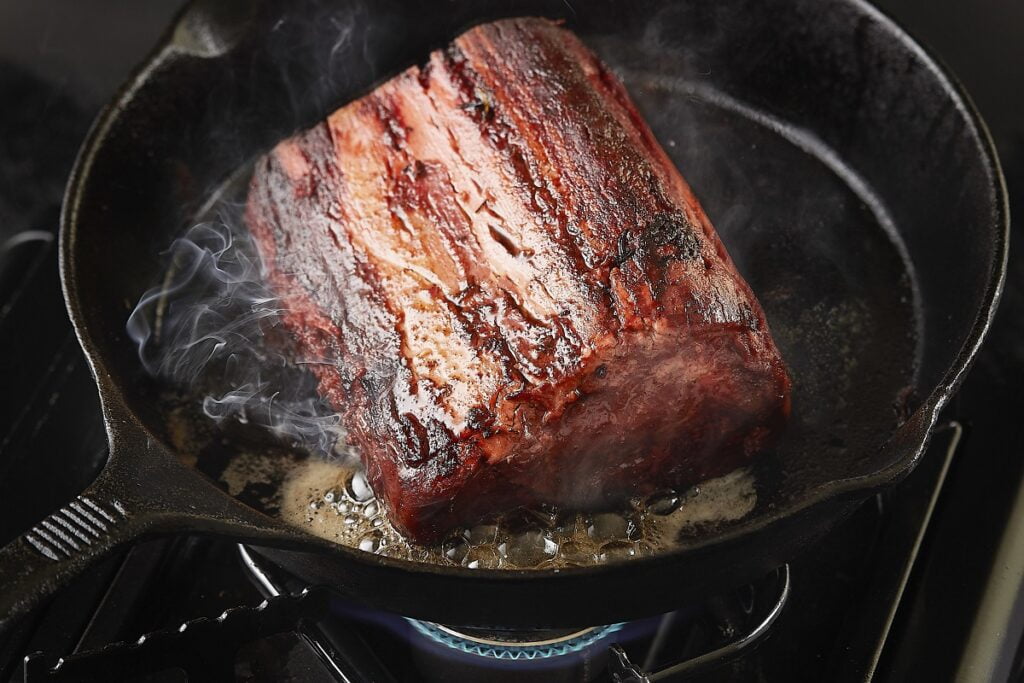Hungry Israelis who scooped up an assortment of “meaty” Mediterranean dishes from a local food truck set up in a Tel Aviv suburb last month were shocked to discover that they had actually consumed 3D-printed, plant-based meat.
The food truck, which served up grilled kebabs and spiced arayes in a pita, among other delicacies, was part of a large-scale blind taste test conducted by Israeli food tech startup Redefine Meat. The company, which unveiled the “world’s first” plant-based alt-steak using 3D printing tech last year, teamed up with Rishon Lezion-based meat distributor Best Meister to dish out alternative meat options to an unsuspecting crowd of carnivores.

Founded in 2018 as Jet Eat by Eshchar Ben-Shitrit and Adam Lahav, Redefine Meat has created a vegan, plant-based meat alternative using digital processes to reduce meat consumption and keep food waste at bay.
The company developed tech for industrial 3D printing of vegan meat substitutes using plant-based formulations. By printing with multiple materials, Redefine Meat says it can create sustainable, high-protein, no-cholesterol steaks that look, cook, and taste like beef.
Last month, the company set out to launch its food truck concept – “There’s a new meat in town” – in partnership with Best Meister to entice passersby in the central Israeli town of Kidron, with a plant-based alternative.
Ben-Shitrit says the startup has always been one to “confront” the reality of a world that relishes animal meat to get feedback on its plant-based product.

“We wanted to be creative in how we serve the most amount of meat to a large number of people in a way that makes sense despite COVID,” he tells NoCamels. “It was supposed to be a small test to generate feedback and ‘prove a point’ to ourselves – that what we produce is already in the category of meat and not just a good alternative for those already willing to compromise. One of the key elements in proving that was to see if our product could pass as great meat, and not just stand out in the Alt-Meat section.”
SEE ALSO: Israeli 3D Printing Startup Successfully Prints Meat Tissue From Stem Cells
The Rehovot-based company expected to offer 200 tastings in two days, Ben-Shitrit says. In just under five hours, the food truck had received over 600 visitors who had purchased close to 1,000 servings of meat.
“Even a minute before the event, we didn’t know how things would end up,” Ben-Shitrit says, “We joked internally that we’re either going to have five people or 200. The optimistic scenario was 200 dishes based on a calculation of guests per hour, with the COVID restrictions.”
It took a full week for the company to find the right location, Ben-Shitrit explains. Due to COVID-19 restrictions, it was only possible to set up in a small area, so the team didn’t have to anticipate demand.
The company started selling the dishes to passersby and in just 15 minutes, a line had started to form.

“There’s something magnetic about people lining up to buy food – it attracts more and more people. Soon word started to spread to other residents of the moshav through WhatsApp groups and people went back home and came back with their spouses and kids for a fun lunch outdoors. We then faced a challenge that we didn’t expect – not enough meat,” Ben-Shitrit says.
Luckily we had backup from another test that we conducted for scale-up and a Best Meister chilled truck available for the day so we were able to replenish inventory. We had people standing in line for over an hour. Almost as soon as it arrived, we asked them to send the message that we’ll run out of stock soon,” he added.

When asked for their feedback on taste, look, and feel, customers were stunned to learn that the “meat” products were made of plant-based ingredients. But this didn’t stop them from raving about the food.
Ben-Shitrit tells NoCamels the company received lots of detailed feedback from qualitative questionnaires and deep interviews with some of the tasters.
The consumers had some intriguing observations, according to Ben-Shitrit. Many people wanted to buy the “meat raw and cook it at home and the company also got very specific feedback on pricing and product attributes like flavor and juiciness.
Sign up for our free weekly newsletter
Subscribe“We had one guy come back in the evening [after buying food earlier.] He said, ‘I have to talk to you about something that bothers me.’ He said, ‘You know, we have lots of vegans and vegetarians here [in Kidron] and you totally missed them. They’re desperate for high-quality alt-meat and they didn’t show up. He even showed me texts in the moshav group WhatsApp of people asking, ‘Are you sure it’s vegan? My friend said she ate there and there’s no chance it’s vegan.'”

“I told him, ‘If you had known it’s a vegan alt-meat food truck, would you stand in line for 50 minutes? And he said, ‘I wouldn’t bother getting out of the house for vegan food,” Ben-Shitrit added.
Ben-Shitrit says the feedback will be implemented in the company’s upcoming launch and will “definitely make the coming products even more amazing.”
All revenue from the event was donated to support local restaurants affected by the COVID-19 pandemic, Redefine Meat said.
A ‘historic moment’ for plant-based meat
The success of the pilot test marks a “historic moment” for Redefine Meat, playing a pivotal role in the formation of a strategic partnership with Best Meister, the company said in a statement.
Redefine Meat says Best Meister will now start commercially distributing their plant-based meat products to restaurants and high-end butchers within the first half of 2021.
SEE ALSO: Israeli Startup Unveils ‘World’s First’ 3D-Printed Vegan Steak
No word yet on which Israeli restaurants will distribute the products.
“The partnership with Best Meister can be described as love at first sight. When we first met over a year ago, we had an alignment of personalities, beliefs, and visions. More than that, both parties so a win-win situation for the future of our businesses and a strong feeling we will enjoy working together. At first, it wasn’t clear what kind of partnership we would have and when – but we kept in close touch until things matured on our side,” Ben-Shitrit explains.
In July, NoCamels reported that with feedback from high-level chefs and butchers, Redefine Meat would ramp up production of its 3D meat printers and alt-meat formulations ahead of market distribution in 2021 as well as start testing its Alt-Steak at select high-end restaurants in Israel.
The product would be offered as part of a chef’s dish with the option to order the printed plant-based steak instead of the regular meat choice.

“In 2020, our plans were to launch products for pilots in restaurants, but COVID-19 dramatically changed that. In the last part of 2020, we reached critical points in product quality and scale and wanted a way to validate our beliefs,” Ben-Shitrit explains.
COVID-19 didn’t allow the company to work in restaurants, but they were able to bring chefs over for “culinary jam sessions” with the Alt-Meat and even in one instance, host a small group of experts for dinner cooked by a chef from the labs, Ben-Shitrit tells NoCamels.
While the pandemic has been a tricky time for Redefine Meat, as it has for so many other businesses, the alt-meat company is looking forward to the future and Ben-Shitrit is optimistic.
“If we are here today, it’s easy to imagine what we can achieve in the next two years,” he tells NoCamels.
Related posts

Editors’ & Readers’ Choice: 10 Favorite NoCamels Articles

Forward Facing: What Does The Future Hold For Israeli High-Tech?

Impact Innovation: Israeli Startups That Could Shape Our Future




Facebook comments